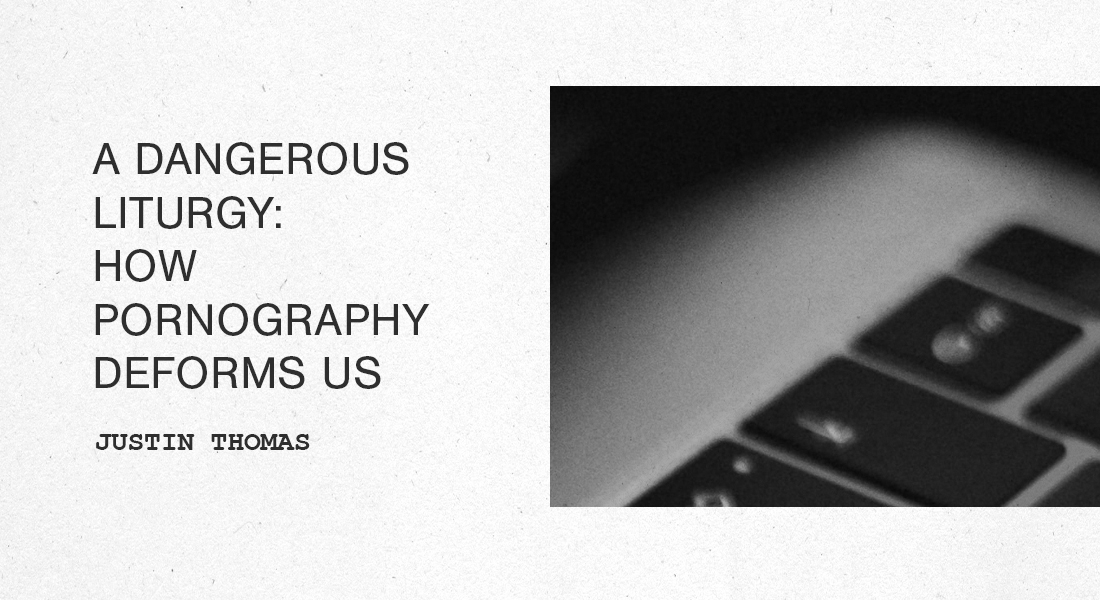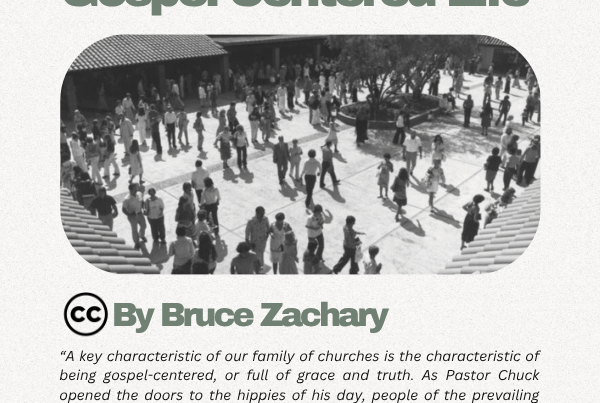
When we think about the effects of pornography, we generally stop once we’ve defined it as morally wrong. We rarely take time to think about how engaging with pornography changes us, and what kind of a person it makes us into. This is not just to say that pornography is bad for you; it is to say that engaging with pornography forms you, or more accurately, deforms you. Pornography is a dangerous liturgy.
Because we are designed as embodied beings, what we do with our bodies doesn’t just flow from what we think, it reinforces and even reconstructs what we believe. Our physical practices shape our desires, and our desires shape everything else. In the church, we have called these practices liturgies. We don’t just think our praises to God; we sing them loudly with our mouths. We don’t just remember what Christ has done on the cross; we eat, and we drink in communion. We don’t just feel love for the body of Christ; we embrace, we kiss, we wash one another’s feet. Again, this doesn’t just express what we believe. Instead, these practices are part of our becoming who God is calling us to be.
However, because this is part of what it means to be human, as James K.A. Smith argues in Desiring the Kingdom, all of life is liturgical, and all our practices are continually shaping us. As he says, “Liturgies aim our love to different ends precisely by training our hearts through our bodies.”1 This includes a habit of using pornography. This reality is especially heightened when it is tied to the fact that God has designed sex to be a liturgical act in marriage, not merely expressing the marriage covenant but expressing it bodily in a way that shapes the marriage. It says with our body what the marriage is supposed to express in total: I belong to you. Beyond the theological aspect, there is also a biological component that makes pornography especially impacting (and addictive). What this means is that using pornography changes the way we think about (and go about) sexual relationships, and it does so in a way that goes directly against the grain of God’s design.
Pornography trains our sexuality in the wrong direction in very significant ways.
First off, pornography wires us for novelty instead of intimacy. God’s design for sexuality is built into his design for marriage summed up in Genesis 2:24 as “the two shall become one flesh.” Sex is designed to be part of a relationship where two complementary partners devote their lives to becoming one. Sex then is exclusive to that relationship, and our sexual desires are informed by our spouse as they change and age. Pornography, however, presents us with an unending supply of different people available for our pleasure. The user goes from picture to picture, or video to video and is never satisfied with what has been seen in the past. Part of what makes pornography pleasurable is the adventurous process of more and different (and sometimes more extreme). It is easy to see how destructive that is to sex in its designed setting. What should be a lifelong wealth of satisfaction in growing intimacy becomes dissatisfying in its limits and familiarity. Porn use doesn’t just fail to meet God’s design; it moves us away from it.
Second, pornography trains us for selfishness instead of giving.
Pornography is a consumable product that exists solely for our pleasure. We take and give nothing in return. In fact, since God designed our sexuality to be embedded in marriage and coupled not just with the reciprocal act of giving our body, but giving our whole selves (think of the refrain in Song of Songs, “I am my beloved’s, and my beloved is mine”), pornography like all sexual immorality is exploitative. Let me be clear here; many outside the church would express concern that some pornography is exploitative: when it involves minors or those caught in sex trafficking, for example. But for us as Christians, there is no way to be a conscientious consumer of pornography. Unlike livestock, it doesn’t matter if those featured are free-range or if the product is cruelty-free. Porn takes and uses another for our pleasure without offering them ourselves. This is not merely about a lack of reciprocity. Sex within marriage isn’t about only taking as much as you give; it is fully and wholly about giving to the other person. Consider Paul’s advice to married couples in 1 Corinthians 7:3-4:
“The husband should give to his wife her conjugal rights, and likewise the wife to her husband. For the wife does not have authority over her own body, but the husband does. Likewise the husband does not have authority over his own body, but the wife does.”
Notice that Paul sees sex in terms of what we owe our spouse, not what they owe us. This isn’t about demanding our rights but serving the other. Pornography forms us to focus on our needs and see our spouse as a means to gratification, or in the well-crafted phrase of Jonathan Grant, as a “happiness technology.” Again, we find that it’s not just that porn is selfish; it shapes our view of sex selfishly.
Finally, pornography pushes us towards isolation when sex was designed to draw us out of ourselves and into relationship with others.
When God said it was not good that Adam was alone in the garden, it was partly because he couldn’t be fruitful and multiply on his own, and it takes a whole society to display the image of God properly. Sexual desire is tied into this God-designed need for community. Pornography, however, doesn’t move toward community. Pornography thrives in privacy. This is not just because of the shame attached to it, but because it does not require the existence of others to meet our needs. This is only heightened when you include the imagination, as Jesus does, in sexual immorality (Matthew 5:28). C.S. Lewis hits the nail on the head in a letter he wrote to a young man about masturbation:
“For me, the real evil of masturbation would be that it takes an appetite which, in lawful use, leads the individual out of himself to complete (and correct) his own personality in that of another (and finally in children and even grandchildren) and turns it back: sends the man back into the prison of himself, there to keep a harem of imaginary brides. And this harem, once admitted, works against his ever getting out and really uniting with a real woman. For the harem is always accessible, always subservient, calls for no sacrifices or adjustments, and can be endowed with erotic and psychological attractions which no real woman can rival. Among those shadowy brides, he is always adored, always the perfect lover: no demand is made on his unselfishness, no mortification ever imposed on his vanity. In the end, they become merely the medium through which he increasingly adores himself.”2
All this means is that present, or even past use of pornography, leaves its mark on us and our relationships.
We see this increasingly in our society; there would be no #metoo movement if we weren’t so shaped as a culture by wrong practices of sex. We see it in the rampant loneliness of a world that has lost the art of family, friendship and community. We see it in countless marriages as our sexual desires dominate and distort God’s purpose in marriage. In a world awash in pornography, this can be tremendously discouraging. Many of us can look back on years of deforming habits and liturgies of sin and wonder if there is any road back. However, the hope we have as Christians is that, in the same way, we can be deformed by pornography, we can be transformed in Christ. This is not just about believing the right things about Jesus, but about practicing his ways. By cultivating proper habits of sexuality (what the church historically has called chastity), and proper relationships with humans that affirm God’s design and their image-bearing nature (think of Paul telling Timothy to treat younger women like sisters with all purity), we can put-off the old practices of sexuality, and through putting on the new ways of Christ, be transformed by the renewing of our mind (Ephesians 4:22-23).
Originally published on July 21, 2020
Notes:
1 Smith, James K.A. Desiring the Kingdom.
2 Lewis, C. S. (2004–2007). The Collected Letters of C. S. Lewis. (W. Hooper, Ed.) (Vol. 3, p. 758). New York: HarperCollins e-books; HarperSanFrancisco.









